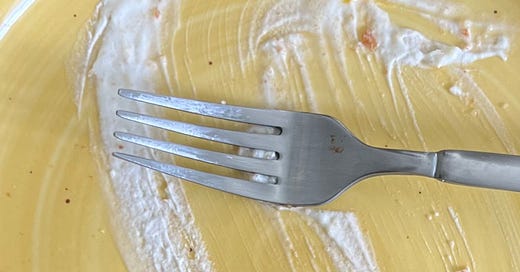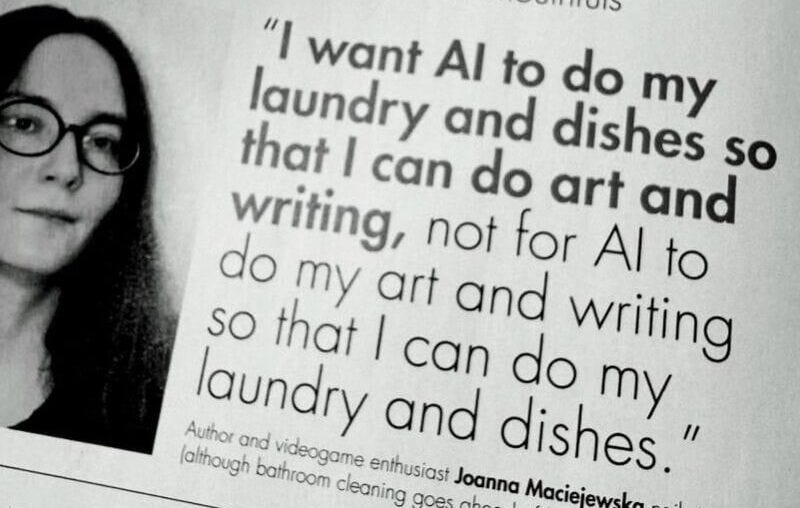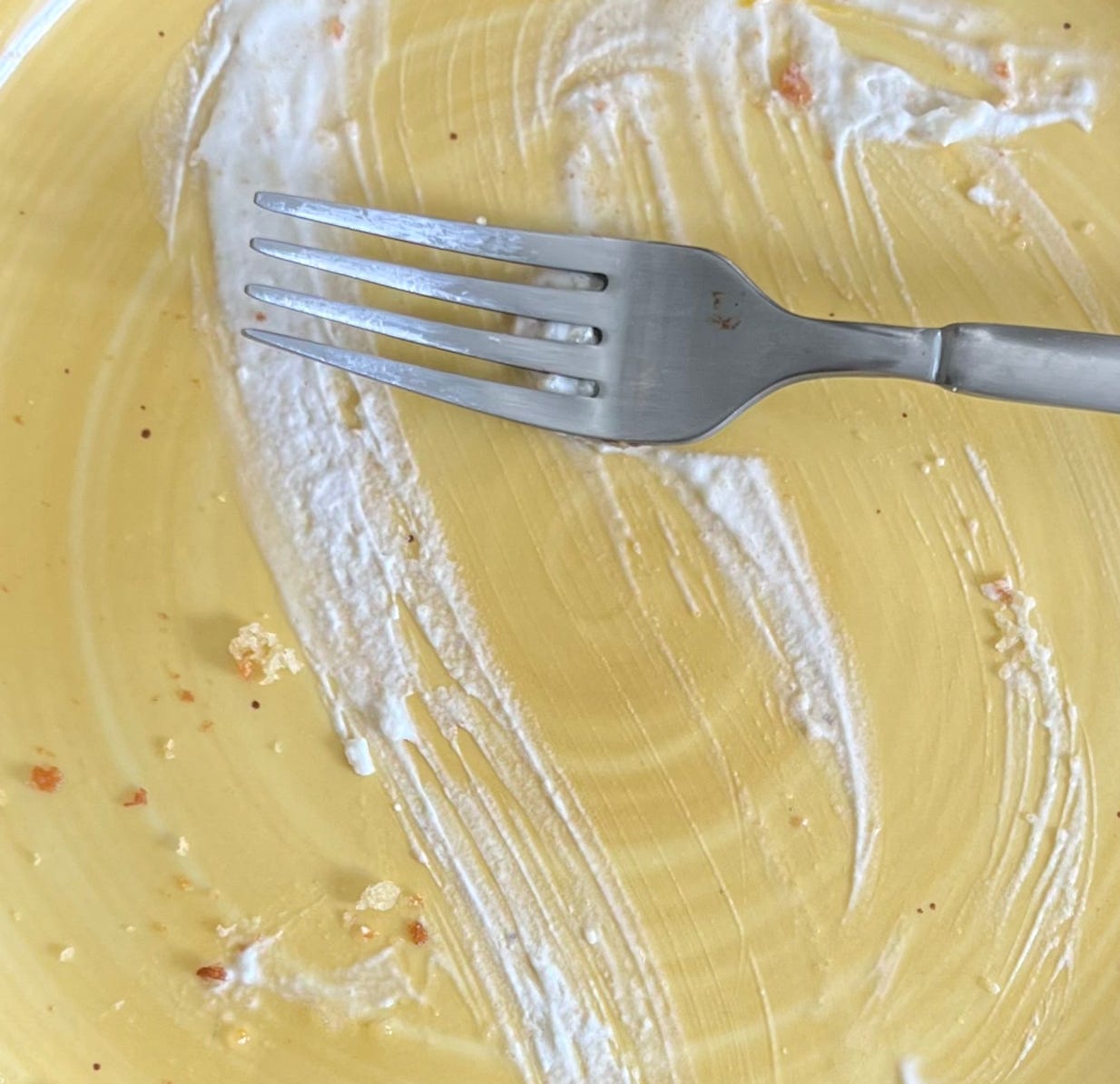This March, author Joanna Maciejewka wrote a tweet that went viral: “You know what the biggest problem with pushing all-things-AI is? Wrong direction. I want AI to do my laundry and dishes so that I can do art and writing, not for AI to do my art and writing so that I can do my laundry and dishes.”
When I came across her tweet, I agreed immediately, implicitly. Over the next few days, I saw it quoted again and again – reposted on Twitter (I won’t call it X, sorry!), quoted in various LinkedIn posts by the paragraph writing prophets there (I mostly avoid LinkedIn), and screenshotted in Instagram stories (no major qualms). Each time I read it, each time I saw someone else in agreement, the devil’s advocate in me began asking questions and pushing back. On occasion, my habit to hear out and represent the opposition is a frustrating quality, but more often than not, it inspires critical thinking that’s worth my while. Fortunately, I’ve learned to keep my devil inside of my head until he (yes, of course, “he”) has finished making his case. Apologies to my friends in college who endured my questioning before I learned that sometimes it’s better to wait, or simply to not.
I fear sounding like a luddite, or being a luddite perhaps, but I have come to believe that when technology makes our lives easier, it also tends to distance us from real living. It’s similar to the way social media was pitched as a means of increasing and enhancing connection (“Now you can see photos of your cousins on Facebook!”), when in reality it keeps many of us staring down at a screen rather than out into the world, where real connections are made. Yes, it allows for more regular “interactions” with friends and acquaintances and strangers alike, but they’re cheap, which is not to say worthless, but not comparable to the interactions and conversations that happen face to face, eye to eye. Yes, I can see photos of my cousins on Facebook, but wouldn’t a visit or even a phone call go a much longer way? My generation, Gen Z, is the loneliest generation that the world has seen. In her Substack essay Aren’t You Lonely?, Freya India explores this:
“Gen Z are posting friendship applications on Facebook. We’re ruminating on Reddit forums about why we feel so alone, and why there’s no community anymore. We eat dinner with YouTubers. We pretend to FaceTime influencers. We play video games alone in our rooms, or watch strangers play instead. Even the fact that #mentalhealth has over a hundred billion views on TikTok seems to me less a triumph of mental health awareness and more like a collective cry of loneliness. Why aren’t we opening up to each other, in real life? Why are we telling TikTok?”
In May 2023, the U.S. Surgeon General, Dr. Vivek Murthy, wrote a report on the state of loneliness in the United States. In it, he cites plentiful scientific research and observations, painting a very clear picture: loneliness and social isolation are public health concerns (more widespread than smoking, diabetes or anxiety), warranting the declaration of an epidemic — the loneliness epidemic, our loneliness epidemic. So, so, incredibly sad. The report is long, but fascinating and important, and includes steps we can take to work our way through this. Worth at least skimming.

Many factors contribute to the wide-spreading of loneliness, but there is no denying that social media is a major one, if not the main one. This is not an anti-social-media piece, so I am going to refrain from getting into the pros and cons of social media in detail. Broadly, I think it has the potential to open up someone’s world, to entertain, to forge connections between strangers. Theoretically, that’s all great! And I do feel that social media has some seemingly positive impacts on my life – I discover writers and artists I’m not sure I would without it, I see glimpses of lives so different from mine that expand my perspective and inspire me in ways, I laugh at funny people (I love funny people), I smile at videos of animals and kids being pure and sweet, and sometimes, I learn something. Even so, I do not think it has categorically or holistically made our lives better. I think its illusions have allowed us to get away with searching for less in our real lives, ultimately hurting us more than it helps us.
It’s hard, really hard even, to reject some new technology and any way it promises to make your life easier. As humans, we’re hard-wired to follow the path of least resistance. We are driven by efficiency; we are instinctively compelled to minimize the time, energy, and resources required to accomplish something. It’s thermodynamics: “all systems move towards a state with the least amount of energy consumption. If we translate this to our brains, it means our brain will take the path of least resistance when given the opportunity (the least energy consumption).” Biologically, we look to maximize benefit while minimizing effort, limiting brain “taxes” when we can. Which, conversely, is one of the main ways you can keep your brain young – by challenging it (stimulating new connections between nerve cells).
New technologies often offer simplification, or simply to take over some taxing act, which, neurologically, is extremely attractive. And so, we associate “easier” with “better,” which is precisely where I think we’re making the wrong leap, as totally subconscious and neurological and thermodynamic as it may be.
If AI were here to do my dishes and my laundry, I would most likely no longer spend the time doing either myself. I am human. Let’s say that right now I spend 20 minutes doing my dishes each day, and 40 minutes doing my laundry twice a week. Insert AI and I’d have a brand new and empty 3 hours and 40 minutes each week.
When I originally worked out that time, I wrote that I’d get “3 hours and 40 minutes back each week.” I imagine those in agreement with Joanna are thinking of it this way too. Oh how deeply capitalism has seeped into our psyche. Time back. Back? That time was mine and is mine, and will always be mine, but I involuntarily processed it as “time back,” as in, returned to me, because time spent doing dishes and laundry is time generally considered as “in the way” of productivity, whether that be creative or corporate or in the name of health. I could be writing! I could be working! I could be reading! I could be at the gym! Insert your “I could be __!” here. Capitalist culture has made it so that laundry and dishes and chores of all kinds are considered necessary but not productive, so they are commonly considered a burden or a waste of time. Even if you, like me, feel really good after cleaning your room or doing your dishes, you still probably dreaded the prospect of doing so, and really only value the outcome: clean room, clean clothes.
But what happens when we no longer have to take care of our spaces and our belongings ourselves? When we don’t fumble around fitting a duvet into its cover? When we don’t fold our fresh t-shirts or scrub dinner off of our plates? When we’re even less bound to the physical world? When we are shed of the responsibilities that we dreaded and feared as kids, that define adulthood in part, that we love to complain about together? When we don’t spend time being present with our things?
While time consuming, labor inducing, and mentally taxing (even if minorly), maintaining your space and yourself is meaningful, and not just because your silverware will be clean and your clothes fresh, but because that time spent taking care is time in which you have the opportunity to be present with yourself, to slow down, to pay attention, to appreciate. An opportunity that is harder and harder to take advantage of when there are texts to respond to, TikToks to laugh at, Instagram posts to scroll through, NYT puzzles to finish, work to be done, and so on. Our minds are easily pulled elsewhere when we are standing at the sink. But when you yank your mind back to here, again and again (because it will try to leave), you spend precious time with yourself – you are alive and taking care of yourself, a beautiful and simple form of self-love. One that I think you are better for feeling.
In his The Miracle of Mindfulness: An Introduction to the Practice of Meditation, a Vietnamese Buddhist monk, Thich Nhat, writes in detail about the power of mindfulness, a term he uses “to refer to keeping one's consciousness alive to the present reality,” and ways to live mindfully through practicing meditation. He includes many anecdotes, even one about doing the dishes (!):
“One night, Jim asked if he might do the dishes. I said, ‘Go ahead, but if you wash the dishes you must know the way to wash them.’ Jim replied, ‘Come on, you think I don't know how to wash the dishes?’ I answered, ‘There are two ways to wash the dishes. The first is to wash the dishes in order to have clean dishes and the second is to wash the dishes in order to wash the dishes.’ Jim was delighted and said, ‘I choose the second way – to wash the dishes to wash the dishes.’ From then on, Jim knew how to wash the dishes. I transferred the ‘responsibility’ to him for an entire week. If while washing dishes, we think only of the cup of tea that awaits us, thus hurrying to get the dishes out of the way as if they were a nuisance, then we are not ‘washing the dishes to wash the dishes.’ What's more, we are not alive during the time we are washing the dishes. In fact we are completely incapable of realizing the miracle of life while standing at the sink. If we can't wash the dishes, the chances are we won't be able to drink our tea either. While drinking the cup of tea, we will only be thinking of other things, barely aware of the cup in our hands. Thus we are sucked away into the future – and we are incapable of actually living one minute of life.”
I am not suggesting that choosing to slow down and be present in these moments is easy, but with practice, I think you can. The yanking back will become more of a tugging here. And I think you’ll find that it grants you a peace of mind that is harder to channel in most moments of the day, an appreciation for being alive. A simple yet mountainous joy.
I don’t want AI to do our dishes or our laundry. It matters that we do them ourselves, and that time spent is not at all a waste if you invite yourself to see it that way. I’m working on it myself, and I can’t say I’m nailing it every time, but I’m getting better, and it feels good. As burdensome as they can feel, I am finding quiet happiness in scrubbing my plates, in folding my clothes after a vacation (and admittedly, letting my mind wander to the past – thinking about swimming in the lake with friends in that string bikini, about the dinner I had when I wore that blue silk skirt). I’d rather AI not tempt me. And if it does one day, I hope that I’ll have cultivated the conviction by then to reject it, to take a left where the path of least resistance invites me to take a right.
Editor’s Note (I am my editor):
This is not about criticizing Joanna or her take. It’s just a tweet after all. I understand the sentiment, what she yearns for – I myself am one to complain about how hard it can be to find time to write. I mostly blame life – it’s always in the way, it’s also the only way, it’s what gives me anything to say at all. I understand the desire for AI to take some of that off of our plates. I just don’t think it would have the precisely positive effect we imagine it might.
Additionally, I want to clarify that I do not think this applies the same to everyone – it is a privilege, really, to have the energy and capacity to take care of yourself and your space. One that I am aware not everyone has. If you do though, I hope you found something in this.
And while I’m down here leaving a note … Thank you for reading! It means so very much to me.






Wise words, and a balance that means a lot to me helping harness this tech for addressing health span and loneliness among older adults every day. It's never about the AI in isolation, but what it enables by the force of human nature, often deviating from intended design.
Great read! Insightful, nuanced, and well researched. Bravo!